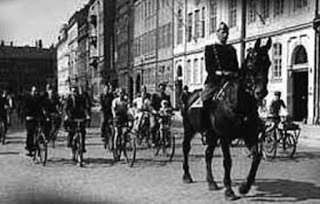We left off Part II of Preben's life story with his graduation from high school in 1942.
Like all Danes in the 1940s, Preben's life was disrupted by the Nazi occupation, which began in 1940. King Christian X used to ride his horse unprotected on the streets of Copenhagen in order to encourage the people to bear up under Hitler's oppression. Preben must have seen this many times.
One memory of that time that Preben related in his letters was from the summer of 1944 when he was looking forward to a visit with friends to Dueodde on the Island of Bornholm where there is a fine beach. "[B]ut the day before our arrival the Germans occupied the youth hostel, so we had to change itinerary and skip Dueodde". (Letter dated January 10, 2011.)
Preben describes the first few years after high school as follows:
"I
finished high-school June 1942 and had an idea to be a pharmacist but
in those days you had to be an apprentice two years with a pharmacist
before the theoretical studies and only a few places were [available]. I
did not find one. Reason to go into business studies and as the bank
account was in low waters, it had to be evening studies in business
college, while working in the daytime. I found a rather good beginner
job with Remington's sole agent for Denmark in which I progressed as I
did with the studies to a point where the boss wanted me to continue to
be a certified public accountant serving his customers when installing
bookkeeping machines." (Letter dated December 13, 1998.)
The German occupation ended on May 5, 1945, shortly before Preben's twenty-second birthday and Preben's circumstances reconfigured as a result.
Three of Preben's maternal uncles had long before emigrated to the United States. "Early spring 1947 my uncle . . . from California, who, as his brothers, from 1945 had sent wonderful food packages to his three sisters in Denmark, arrived to see how we had supported the war years . . . He said to me and other of my cousins that if we could pay our trip forward and back to California, he meant he was able to find us a job for a couple of years.
"At 24, I said to myself, this is a chance you should not let go, you can always come back to studies. The occupation years had restricted many activities, so my savings account had grown . . . a little. Enough to pay a [round trip] ticket on the Gdynia-America line - 10 days across the Atlantic - a [G]reyhound ticket to [Michigan] . . a plane via Chicago to Los Angeles and [G]reyhound back to N.Y. (a year later).
"My answer was: I'm ready, let us go to the American Consulate to fill in the papers (this to avoid sending forward and back papers after [the uncle's] return to L.A.) He accepted but the problem was an immigrant's visa would need a couple of years, so I took a student's visa and could go immediately after having finished the school year and given sufficient notice to my boss who was [disappointed] but congratulated me on the decision, hoping to see me after the return.
"I left Copenhagen 26 November 1947, time of the year for a rough crossing!!" (Letter dated December 13, 1998.)
Here is how Preben described his time in America: "[My uncle] took me down to L.A. to see the Remington Company, but they were not allowed to engage on a student's visa, so we went back to San Fernando Valley and decided to give a helping hand in the construction business with my cousins[.] Quite different from white collar work, but healthy [.] (Letter dated December 13, 1998.)
Preben went on to say, "During the summer three months in [Michigan] selling groceries from [another uncle's] shop. Autumn in North Hollywood, Ahrens Kitchen, cleaning tables, dish washing and so on."
While selling groceries in Michigan at the other uncle's store in the summer of 1948, Preben was interviewed by a local newspaper about his impressions as a young foreign visitor. Preben said he found American life "so busy" and that he thought American business customs "did not provide enough leisure and chance to savor life as you go along."
As for his ability to communicate with Americans, Preben explained that in Denmark, like all students, he had studied English, German, and French. He had no trouble understanding American English but found that Americans had trouble understanding him because he spoke English with a British accent.
Preben related that the business school he had attended in Denmark prior to his trip was called in Danish "Handelshøjskolen". During his time in Southern California, however, he had studied one semester at the University of California at Los Angeles (UCLA), taking a course in work simplification and time study.
The article concluded by stating, "When he returns home, the visitor thinks he will recover the tempo of life which he feels he would miss if he stayed here. 'We enjoy small things more than Americans,' he explains."
"As Christmas came up we took a chance not leaving exactly after one year, but the immigration office being curious in January 1949 I left 6 February from N.Y. . . I owe a lot to uncle . . . giving me that chance!" (Letter dated December 13, 1998.)
To be continued . . .





No comments:
Post a Comment